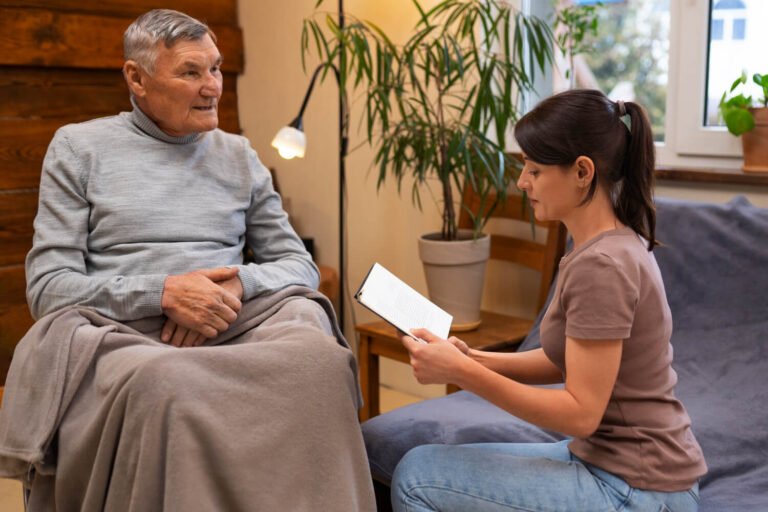The Ultimate Guide to Caregiver Vacationing
How do family caregivers go on vacation?

Family caregivers go on vacation one step at a time. It takes careful planning, good communication with everyone involved and commitment to the realities of vacationing while caregiving.
The first time I took a long weekend trip with my dad, who had dementia, I wasn’t prepared. That first night in the hotel, he kept shining a flashlight around the room, trying to understand where he was. I barely slept.
If only I’d had a thoughtful, engaging and authoritative blog post to refer to …
Caregiver Attitudes About Vacationing
According to a June 2024 AARP report, half of adult caregivers avoid taking personal trips. The reasons? Primarily, it’s their concern for the physical health of those they care for.
They’re also afraid that they won’t have access to needed medical assistance while vacationing.
On the other hand, about half of traveling caregivers reported improved emotional well-being and social connectedness on account of taking a personal trip. Almost half also reported improved emotional or mental health for their care recipient.
So, do the benefits of vacationing outweigh its challenges?
Taking time off from caregiving matters more than you think.

If you’re a family caregiver, the idea of going on vacation might seem unrealistic. Who’ll care for your loved one? What if something goes wrong? You may even feel guilty just thinking about it.
But taking time off is a necessity.
Caregiving is hard work. It’s physically and emotionally draining, and it often leaves caregivers feeling tired, stressed and alone. One elder care consultant observed, “Caregiver guilt is real, but everyone deserves a break. As a caregiver, you must take care of yourself in order to take care of someone else.”
Taking a vacation is a form of self-care. It can help you rest, recharge and return to caregiving with more patience and strength. It lets you care for yourself so you can keep caring for your loved one well.
Plan ahead: Start early for less stress.

When it comes to vacation planning as a caregiver, timing is everything. The more time you give yourself to plan, the smoother things will go.
Here’s a general guide:
- 3 months before: Decide on your vacation dates and research care options for your loved one. Start making phone calls and gathering recommendations.
- 2 months before: Confirm care providers or respite stays. Schedule any appointments your loved one may need before you go.
- 1 month before: Prepare important documents, stock up on supplies, and begin communicating your plans to your loved one.
Early planning not only helps with logistics, it also gives everyone time to prepare themselves emotionally. Taking a vacation means there will be some temporary routine and care access changes that may cause some additional anxiety at first.
Explore care options while you’re away.

Many caregivers feel stuck because they don’t know who can step in while they’re gone. But there are several good options to consider, depending on your loved one’s needs.
In-Home Care
Hiring a professional caregiver to visit or stay in your loved one’s home can offer peace of mind. Agencies can help match you with someone qualified. In some cases, trusted nursing students or independent caregivers may also be available.
Need more ideas about hiring in-home care? Check out these hiring process tips.
Adult Day Programs
If your loved one enjoys being around others, an adult day center can provide social activities, meals and supervision during the day. You can arrange evening help from a family member, friend or in-home caregiver if needed.
Respite Care or Short-Term Stays
Many assisted living communities and nursing homes offer short-term stays for older adults. These facilities provide full-time care and allow your loved one to enjoy a change of scenery in a safe setting.
Help from Family or Friends
Ask trusted relatives, friends or neighbors if they can help. Even if they can’t provide full-time care, they might assist with check-ins, meals or errands. It may be a good idea to do a practice day or two before you leave, especially if they’re new to caregiving.
Each option comes with its own costs and considerations. Some may be covered by long-term care insurance or hospice support, so be sure to check what’s available to you.
Create a care folder to keep everyone informed.
One of the best caregiver tips for vacation planning is to prepare a care folder. This folder should include everything a substitute caregiver needs to know to provide safe, consistent care.
Consider including things like:
- Your travel itinerary and contact information.
- Emergency contacts, including family, neighbors and medical professionals.
- A current medication list with dosages and schedules.
- Food allergies or dietary restrictions.
- A daily routine checklist for things like bathing, meals and bedtime.
- Copies of Power of Attorney, Advance Directives, and do-not-resuscitate (DNR) orders.
Also include a logbook for the caregiver to jot down anything they notice — changes in mood, appetite, sleep or health. This will help you catch up quickly when you return.
Before leaving, stock up on supplies like incontinence products, snacks and pre-cooked meals to make things easier for the caregiver and your loved one.
Talk openly with your loved one.

How you talk to your loved one about your trip matters, especially if they have memory issues.
Start with honesty. Let them know where you’re going, when you’ll be back and who will be helping them while you’re gone. If your loved one has dementia, you may need to wait until closer to your departure date and keep explanations simple. Reassure them often.
Using friendly terms like “a helper” or “a visitor” instead of “caregiver” can reduce anxiety. If your loved one seems upset, it might help to include a neutral third party, such as a care manager or social worker, to guide the conversation.
Learn more about how a geriatric care manager can help.
Let go of the guilt and embrace rest.
Even with everything in place, many caregivers still feel guilty for taking time off. That guilt is real, but it doesn’t have to rule your decisions.
Taking time away from routine caregiving doesn’t mean you’re abandoning your loved one. Instead, you’re doing what’s necessary to stay strong and healthy. And that helps everyone in the long run.
Here are some helpful ways to manage those tough feelings:
- Set boundaries. Decide how often you’ll check in with the caregiver. Too many calls might interrupt your rest, while too few may leave you anxious.
- Remind yourself it’s okay. Rest is part of caregiving. You’re allowed to take care of yourself too.
- Lean on support. Talk to other caregivers who’ve taken breaks. Local or online caregiver support groups are a great place to hear from others who understand.
Most importantly, once your trip begins, trust your plan. You’ve put in the work. Now you can take time to relax.
Let us know in the comments how you’ve made time to recharge, or what’s holding you back.
Caregiver Vacations FAQ
What’s the most affordable care option while I’m away?
In-home caregivers or adult day programs are often the most budget-friendly. They offer flexibility without the cost of full-time facility care.
How can I stay connected without checking in too much?
Set up scheduled check-ins — like once per day — with your substitute caregiver. Let them know what counts as an emergency and when to contact you.
What if I want to bring my loved one with me?
Traveling with a loved one is possible but requires extra planning. Bring all medications, ID, and medical documents. Pack comfort items and allow extra time for rest.
Can I get financial help to cover respite care?
Some long-term care insurance plans and hospice programs offer respite coverage. Also check if your employer provides caregiver benefits.
What if I feel guilty the whole time I’m away?
Remind yourself that guilt doesn’t mean you’re doing something wrong. It means you care. And caring for yourself is one of the best things you can do.






